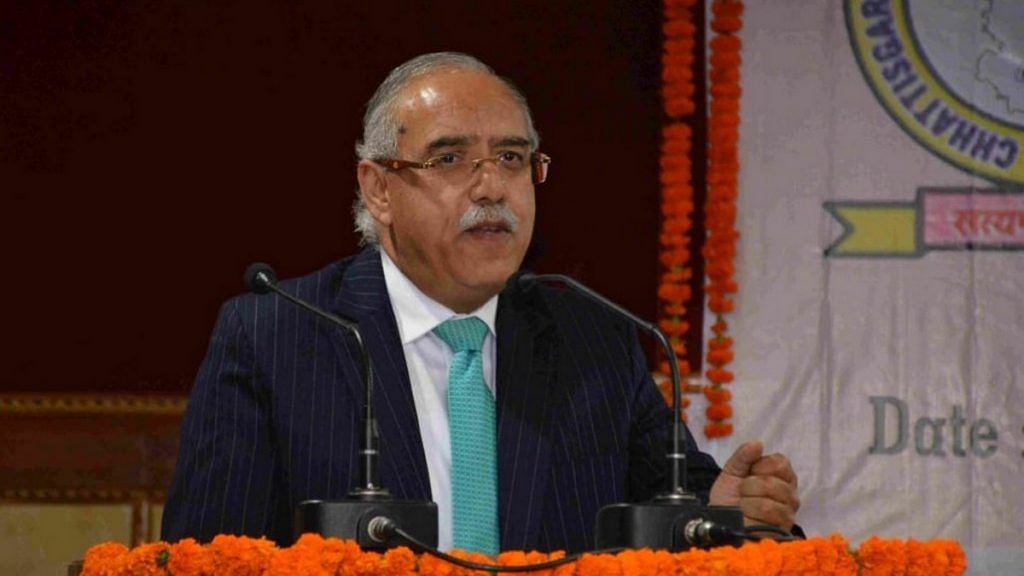New Delhi: Justice Deepak Gupta of the Supreme Court Monday called majoritarianism “the antithesis of democracy”, saying one cannot label dissent as “anti-national” as it is a “human right to disagree”.
Justice Gupta made the comments at the inaugural lecture of the Supreme Court Bar Association, where he was giving his views on ‘Democracy and Dissent’. The comments come amid several protests against the Citizenship (Amendment) Act and the proposed National Register of Citizens and National Population Register across the country, including some that have turned violent in the national capital.
Gupta said although a majority elects a government, the ones who did not vote for it cannot be ignored.
“Justice D.Y. Chandrachud said blanket labelling of dissent as ‘anti-national’ or ‘anti-democratic’ strikes at the heart of our commitment to protect constitutional values and the promotion of deliberative democracy. A government is elected by majority vote, but majoritarianism is the antithesis of democracy,” he said.
He added that suppression of dissent has a chilling effect on democracy, and that “so long as the person does not encourage secession or violence, till then they have the freedom to dissent”.
He also quoted Justice R.F. Nariman’s judgment in the Shreya Singhal case, and said: “If we discourage dissent, it has a chilling effect on free speech.”
Also read: BJP’s failure to see dissenting students as citizens belies Modi’s own youth activist history
Interpret Constitution according to changing times
Highlighting how the Constitution of India needs to be interpreted in accordance with the changing times, Justice Gupta said: “Views on any subject cannot remain constant. The meaning of every word in the Constitution needs to be given an interpretation as time progresses. It needs to be made workable in current times.”
He also called for an impartial decision-making process in the judiciary, and called on everyone to not see dissent from the prism of revolting against the government.
“Today in the country, dissent is seen as anti-national. Government and country are two different things. Rule of law is an integral part of the body politic. There can be no rule of law unless there is free dissent. Decision-making by judges needs to be completely free of political or any other extraneous considerations,” said Justice Gupta.
At a time when several groups protesting against the CAA have taken to reading the Preamble of the Constitution, Justice Gupta said that although “right to dissent” is not explicitly mentioned in the Constitution, it’s still “the most important right”.
“The Preamble has adorned my table since the day I became a judge. Whenever I find myself in trouble, I find the solution in the Constitution. Liberty of thought, expression and belief are there,” said the judge, who is due to retire on 6 May.
“Now read it with Article 19, which speaks for freedom of speech and expression. The most important right in the Constitution is the right to dissent,” he said.
Also read: Bombay HC judge stands up for students’ right to dissent amid widespread protests
Slams bar association resolution on ‘anti-nationals’
Justice Gupta also slammed a resolution passed by the Hubli bar association in Karnataka on 17 February. The association decided not to represent three Kashmiri students charged with sedition for allegedly raising pro-Pakistan slogans, as it would be “anti-national” to do so.
The college students were arrested for posting the slogans on social media a year after the terrorist attack at Pulwama that claimed the lives of 40 CRPF personnel.
Gupta said such resolutions are “not done”, and that “legal aid cannot be denied”.
“I see bar associations passing resolutions saying they will not appear in the matter as anti-national. This is not done. You cannot deny legal aid. Just because you hold a contrary view does not mean you are going against the country. It may be towards the government, but not towards the country,” the judge said.
“It’s an obstruction of delivery of justice. Society will not develop unless somebody questions the rules,” he said, reiterating that his speech should be a message to the lawyers who moved such a resolution.
“If all follow the well-trodden path, there will be no expansion of mind and vistas. Take Gandhi, Marx, Mohammad… Everyone challenged old thoughts,” he said.
Also read: ‘Govt using brute force, suppressing dissent’ — Sonia Gandhi attacks BJP over CAA protests
Earlier comments
This is not the first time that Justice Gupta has underscored the importance of free speech, the right to criticise and differ.
Gupta, born in 1955 in Nurpur (Himachal Pradesh) to a family of lawyers, had said in September 2019 that criticism of the executive, judiciary, bureaucracy or the armed forces cannot be termed as “sedition”.
“A very important aspect of a democracy is that the citizens should have no fear of the government. They should not be scared of expressing views that may not be liked by those in power,” he had said.
Justice Gupta, who was elevated to the top court in February 2017, said dissent in the judiciary is equally important, as “a fearless judiciary is needed for a strong democracy”.
“You have to dissent even if you are all alone in the step being taken, but that needs to be categorically stated. Dissent is a powerful tool at the hands of judges, but must be used carefully,” he had said.
Also read: Why an SC judge’s dissent 43 years ago is relevant to Kashmir clampdown today
